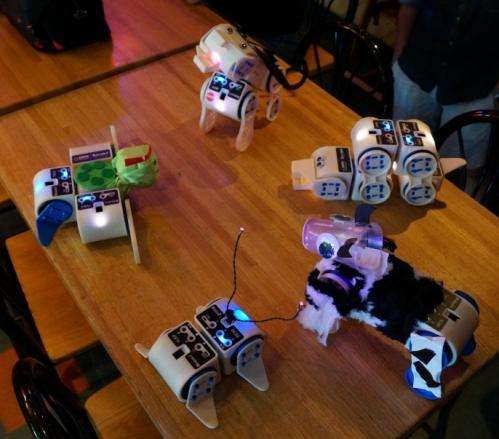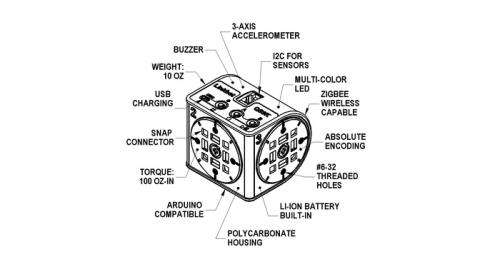May 29, 2013 report
Linkbot learners can build robots on all levels

(Phys.org) —A Kickstarter project offers an interesting value proposition. A Linkbot robot platform helps robot hopefuls learn as they go. This is a modular platform where robot learners can keep it simple or complex, work with single units or explore a swarm; the user can always raise the level of sophistication as skills increase. In short, Linkbot has been thought up as a way to provide a personally rewarding learning curve experience in creating robots.
Linkbot starts out as a single unit while more confident users can think about attaching accessories and connecting the device with other units. Beginners can work with a robot that is pre-assembled and functional out of the box, able to connect wirelessly, without a computer, via "BumpConnect." The company says that BumpConnect "allows Linkbots to connect to each other wirelessly without having to connect to a computer. There is always one master which pulses its lights and can be used to control one or many robots."
Also, according to the company behind the Linkbot, "You can use our SnapConnectors to easily snap-on accessories such as wheels, a gripper, a camera mount.and more." That company is Barobo. Founded in 2010, the company is a spinoff of a technology initiative at the University of California Davis.
The platform was developed by an engineering professor, Harry Cheng, and a school alumnus, Graham Ryland. Barobo received two grants from the National Science Foundation to move this vision forward and the group launched a Kickstarter campaign recently to raise funds for getting Linkbot out there. "We believe that anybody should be able to create robots, regardless of their level," said Ryland, who is company president.
Numerous other features help a builder over the learning curve, including a #6-32 bolt pattern on each mounting surface so that one can attach anything to the Linkbot. The platform is Arduino-compatible . Also, 3-D models of accessories are available if users choose to 3-D print. Each robot has a built-in 3-axis accelerometer, polycarbonate housing, walking motion using accessories or connected Linkbots for limbs, and wheels. Multicolor LEDs and a buzzer are on board.
A rechargeable lithium ion battery powers the Linkbot. The battery lets users drive motors for over three hours with typical use. Charging is done through a USB port that the company said takes about four hours when connected to a computer, but there is less charging time when plugging it into a 1-amp cell phone charger. Using the phone charger, according to the company, it will take less than two hours. The team also developed BaroboLink software, which provides a graphical interface for controlling Linkbots.
The Kickstarter project goal is $40,000. At the time of this writing, they had pledges of $12, 445. The company is offering, for a $129 pledge, a Linkbot, two wheels, the BaroboLink software, and access to the MyBarobo community.

A Linkbot kit with a $349 funding level comes as two Linkbots with four wheels, a Bridge Bone, 16 mounting screws, BarobotLink software, community access, and a SnapConnector. Other pledge levels are available for multiple bots and accessories. The campaign runs until June 18.
Barobo's company message is that "We truly believe that robots are the next generation of technological creativity and advancement, the bridge between the digital and physical world."
More information: www.kickstarter.com/projects/b … t-create-with-robots
© 2013 Phys.org




















